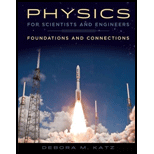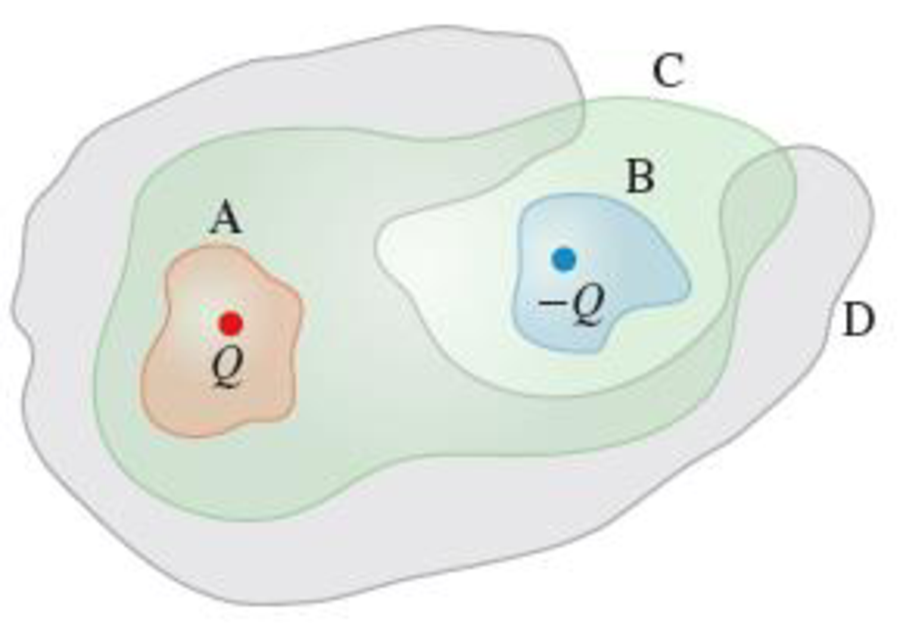
Physics for Scientists and Engineers: Foundations and Connections
1st Edition
ISBN: 9781133939146
Author: Katz, Debora M.
Publisher: Cengage Learning
expand_more
expand_more
format_list_bulleted
Concept explainers
Textbook Question
Chapter 25, Problem 25PQ
A Using Gauss’s law, find the electric flux through each of the closed Gaussian surfaces A, B, C, and D shown in Figure P25.25.

FIGURE P25.25
Expert Solution & Answer
Trending nowThis is a popular solution!

Students have asked these similar questions
Answer this
No chatgpt pls will upvote
No chatgpt pls will upvote instant
Chapter 25 Solutions
Physics for Scientists and Engineers: Foundations and Connections
Ch. 25.1 - a. List all the uppercase letters that have the...Ch. 25.2 - The terms electric force, electric field, and...Ch. 25.2 - Prob. 25.3CECh. 25.3 - Which of the following expressions are correct...Ch. 25.3 - Find the electric flux through the three Gaussian...Ch. 25.4 - Prob. 25.6CECh. 25.7 - Is it possible for the charged solid sphere in...Ch. 25 - Which word or name has the same symmetry as the...Ch. 25 - Prob. 2PQCh. 25 - Prob. 3PQ
Ch. 25 - Prob. 4PQCh. 25 - Prob. 5PQCh. 25 - Prob. 6PQCh. 25 - A positively charged sphere and a negatively...Ch. 25 - A circular hoop of radius 0.50 m is immersed in a...Ch. 25 - Prob. 9PQCh. 25 - If the hemisphere (surface C) in Figure 25.10...Ch. 25 - A Ping-Pong paddle with surface area 3.80 102 m2...Ch. 25 - Prob. 12PQCh. 25 - A pyramid has a square base with an area of 4.00...Ch. 25 - Prob. 14PQCh. 25 - Prob. 15PQCh. 25 - A circular loop with radius r is rotating with...Ch. 25 - A circular loop with radius r is rotating with...Ch. 25 - Prob. 18PQCh. 25 - What is the net electric flux through each of the...Ch. 25 - Prob. 20PQCh. 25 - The colored regions in Figure P25.21 represent...Ch. 25 - Prob. 22PQCh. 25 - Prob. 23PQCh. 25 - Three particles and three Gaussian surfaces are...Ch. 25 - A Using Gausss law, find the electric flux through...Ch. 25 - Three point charges q1 = 2.0 nC, q2 = 4.0 nC, and...Ch. 25 - Prob. 27PQCh. 25 - A very long, thin wire fixed along the x axis has...Ch. 25 - Figure P25.29 shows a wry long tube of inner...Ch. 25 - Two very long, thin, charged rods lie in the same...Ch. 25 - Prob. 31PQCh. 25 - Two long, thin rods each have linear charge...Ch. 25 - Figure P25.33 shows a very long, thick rod with...Ch. 25 - A very long line of charge with a linear charge...Ch. 25 - Two infinitely long, parallel lines of charge with...Ch. 25 - An infinitely long wire with uniform linear charge...Ch. 25 - Prob. 37PQCh. 25 - Prob. 38PQCh. 25 - Prob. 39PQCh. 25 - Prob. 40PQCh. 25 - Two uniform spherical charge distributions (Fig....Ch. 25 - FIGURE P25.41 Problems 41 and 42. Two uniform...Ch. 25 - The nonuniform charge density of a solid...Ch. 25 - Prob. 44PQCh. 25 - What is the magnitude of the electric field just...Ch. 25 - Prob. 46PQCh. 25 - The infinite sheets in Figure P25.47 are both...Ch. 25 - Prob. 48PQCh. 25 - Prob. 49PQCh. 25 - Prob. 50PQCh. 25 - A very large, flat slab has uniform volume charge...Ch. 25 - FIGURE P25.41 Problems 51 and 52. Find the surface...Ch. 25 - Prob. 53PQCh. 25 - Prob. 54PQCh. 25 - If the magnitude of the surface charge density of...Ch. 25 - A spherical conducting shell with a radius of...Ch. 25 - A charged rod is placed in the center along the...Ch. 25 - A charged rod is placed in the center along the...Ch. 25 - A thick spherical conducting shell with an inner...Ch. 25 - A thick spherical conducting shell with an inner...Ch. 25 - A rectangular plate with sides 0.60 m and 0.40 m...Ch. 25 - Prob. 62PQCh. 25 - Prob. 63PQCh. 25 - A uniform spherical charge distribution has a...Ch. 25 - A rectangular surface extends from x = 0 to x =...Ch. 25 - A uniform electric field E = 1.57 104 N/C passes...Ch. 25 - A solid plastic sphere of radius R1 = 8.00 cm is...Ch. 25 - Examine the summary on page 780. Why are...Ch. 25 - Prob. 69PQCh. 25 - Prob. 70PQCh. 25 - Prob. 71PQCh. 25 - A coaxial cable is formed by a long, straight wire...Ch. 25 - Prob. 73PQCh. 25 - Prob. 74PQCh. 25 - A solid sphere of radius R has a spherically...Ch. 25 - A solid sphere of radius R has a spherically...Ch. 25 - A very large, horizontal conducting square plate...Ch. 25 - Prob. 78PQCh. 25 - A particle with charge q = 7.20 C is surrounded by...Ch. 25 - A sphere with radius R has a charge density given...
Knowledge Booster
Learn more about
Need a deep-dive on the concept behind this application? Look no further. Learn more about this topic, physics and related others by exploring similar questions and additional content below.Similar questions
- Kirchoff's Laws. A circuit contains 3 known resistors, 2 known batteries, and 3 unknown currents as shown. Assume the current flows through the circuit as shown (this is our initial guess, the actual currents may be reverse). Use the sign convention that a potential drop is negative and a potential gain is positive. E₂ = 8V R₁₁ = 50 R₂ = 80 b с w 11 www 12 13 E₁ = 6V R3 = 20 a) Apply Kirchoff's Loop Rule around loop abefa in the clockwise direction starting at point a. (2 pt). b) Apply Kirchoff's Loop Rule around loop bcdeb in the clockwise direction starting at point b. (2 pt). c) Apply Kirchoff's Junction Rule at junction b (1 pt). d) Solve the above 3 equations for the unknown currents I1, 12, and 13 and specify the direction of the current around each loop. (5 pts) I1 = A 12 = A 13 = A Direction of current around loop abef Direction of current around loop bcde (CW or CCW) (CW or CCW)arrow_forwardNo chatgpt pls will upvotearrow_forward4.) The diagram shows the electric field lines of a positively charged conducting sphere of radius R and charge Q. A B Points A and B are located on the same field line. A proton is placed at A and released from rest. The magnitude of the work done by the electric field in moving the proton from A to B is 1.7×10-16 J. Point A is at a distance of 5.0×10-2m from the centre of the sphere. Point B is at a distance of 1.0×10-1 m from the centre of the sphere. (a) Explain why the electric potential decreases from A to B. [2] (b) Draw, on the axes, the variation of electric potential V with distance r from the centre of the sphere. R [2] (c(i)) Calculate the electric potential difference between points A and B. [1] (c(ii)) Determine the charge Q of the sphere. [2] (d) The concept of potential is also used in the context of gravitational fields. Suggest why scientists developed a common terminology to describe different types of fields. [1]arrow_forward
- 3.) The graph shows how current I varies with potential difference V across a component X. 904 80- 70- 60- 50- I/MA 40- 30- 20- 10- 0+ 0 0.5 1.0 1.5 2.0 2.5 3.0 3.5 4.0 4.5 5.0 VIV Component X and a cell of negligible internal resistance are placed in a circuit. A variable resistor R is connected in series with component X. The ammeter reads 20mA. 4.0V 4.0V Component X and the cell are now placed in a potential divider circuit. (a) Outline why component X is considered non-ohmic. [1] (b(i)) Determine the resistance of the variable resistor. [3] (b(ii)) Calculate the power dissipated in the circuit. [1] (c(i)) State the range of current that the ammeter can measure as the slider S of the potential divider is moved from Q to P. [1] (c(ii)) Describe, by reference to your answer for (c)(i), the advantage of the potential divider arrangement over the arrangement in (b).arrow_forward1.) Two long parallel current-carrying wires P and Q are separated by 0.10 m. The current in wire P is 5.0 A. The magnetic force on a length of 0.50 m of wire P due to the current in wire Q is 2.0 × 10-s N. (a) State and explain the magnitude of the force on a length of 0.50 m of wire Q due to the current in P. [2] (b) Calculate the current in wire Q. [2] (c) Another current-carrying wire R is placed parallel to wires P and Q and halfway between them as shown. wire P wire R wire Q 0.05 m 0.05 m The net magnetic force on wire Q is now zero. (c.i) State the direction of the current in R, relative to the current in P.[1] (c.ii) Deduce the current in R. [2]arrow_forward2.) A 50.0 resistor is connected to a cell of emf 3.00 V. The voltmeter and the ammeter in the circuit are ideal. V A 50.00 (a) The current in the ammeter is 59.0 mA. Calculate the internal resistance of the cell. The circuit is changed by connecting another resistor R in parallel to the 50.0 resistor. V A 50.00 R (b) Explain the effect of this change on R is made of a resistive wire of uniform cross-sectional area 3.1 × 10-8 m², resistivity 4.9 × 10-70m and length L. The resistance of R is given by the equation R = KL where k is a constant. (b.i) the reading of the ammeter. [2] (b.ii) the reading of the voltmeter. [2] (c) Calculate k. State an appropriate unit for your answer. [3] [2]arrow_forward
- No chatgpt pls will upvotearrow_forwardNo chatgpt pls will upvotearrow_forwardA rod 12.0 cm long is uniformly charged and has a total charge of -20.0 μc. Determine the magnitude and direction of the electric field along the axis of the rod at a point 32.0 cm from its center. 361000 ☑ magnitude What is the general expression for the electric field along the axis of a uniform rod? N/C direction toward the rodarrow_forward
- A certain brand of freezer is advertised to use 730 kW h of energy per year. Part A Assuming the freezer operates for 5 hours each day, how much power does it require while operating? Express your answer in watts. ΜΕ ΑΣΦ ? P Submit Request Answer Part B W If the freezer keeps its interior at a temperature of -6.0° C in a 20.0° C room, what is its theoretical maximum performance coefficient? Enter your answer numerically. K = ΜΕ ΑΣΦ Submit Request Answer Part C What is the theoretical maximum amount of ice this freezer could make in an hour, starting with water at 20.0°C? Express your answer in kilograms. m = Ο ΑΣΦ kgarrow_forwardDescribe the development of rational choice theory in sociology. Please includearrow_forwardA-E pleasearrow_forward
arrow_back_ios
SEE MORE QUESTIONS
arrow_forward_ios
Recommended textbooks for you
 Physics for Scientists and Engineers: Foundations...PhysicsISBN:9781133939146Author:Katz, Debora M.Publisher:Cengage Learning
Physics for Scientists and Engineers: Foundations...PhysicsISBN:9781133939146Author:Katz, Debora M.Publisher:Cengage Learning Principles of Physics: A Calculus-Based TextPhysicsISBN:9781133104261Author:Raymond A. Serway, John W. JewettPublisher:Cengage Learning
Principles of Physics: A Calculus-Based TextPhysicsISBN:9781133104261Author:Raymond A. Serway, John W. JewettPublisher:Cengage Learning Physics for Scientists and EngineersPhysicsISBN:9781337553278Author:Raymond A. Serway, John W. JewettPublisher:Cengage Learning
Physics for Scientists and EngineersPhysicsISBN:9781337553278Author:Raymond A. Serway, John W. JewettPublisher:Cengage Learning Physics for Scientists and Engineers with Modern ...PhysicsISBN:9781337553292Author:Raymond A. Serway, John W. JewettPublisher:Cengage Learning
Physics for Scientists and Engineers with Modern ...PhysicsISBN:9781337553292Author:Raymond A. Serway, John W. JewettPublisher:Cengage Learning

Physics for Scientists and Engineers: Foundations...
Physics
ISBN:9781133939146
Author:Katz, Debora M.
Publisher:Cengage Learning

Principles of Physics: A Calculus-Based Text
Physics
ISBN:9781133104261
Author:Raymond A. Serway, John W. Jewett
Publisher:Cengage Learning

Physics for Scientists and Engineers
Physics
ISBN:9781337553278
Author:Raymond A. Serway, John W. Jewett
Publisher:Cengage Learning

Physics for Scientists and Engineers with Modern ...
Physics
ISBN:9781337553292
Author:Raymond A. Serway, John W. Jewett
Publisher:Cengage Learning
Electric Fields: Crash Course Physics #26; Author: CrashCourse;https://www.youtube.com/watch?v=mdulzEfQXDE;License: Standard YouTube License, CC-BY